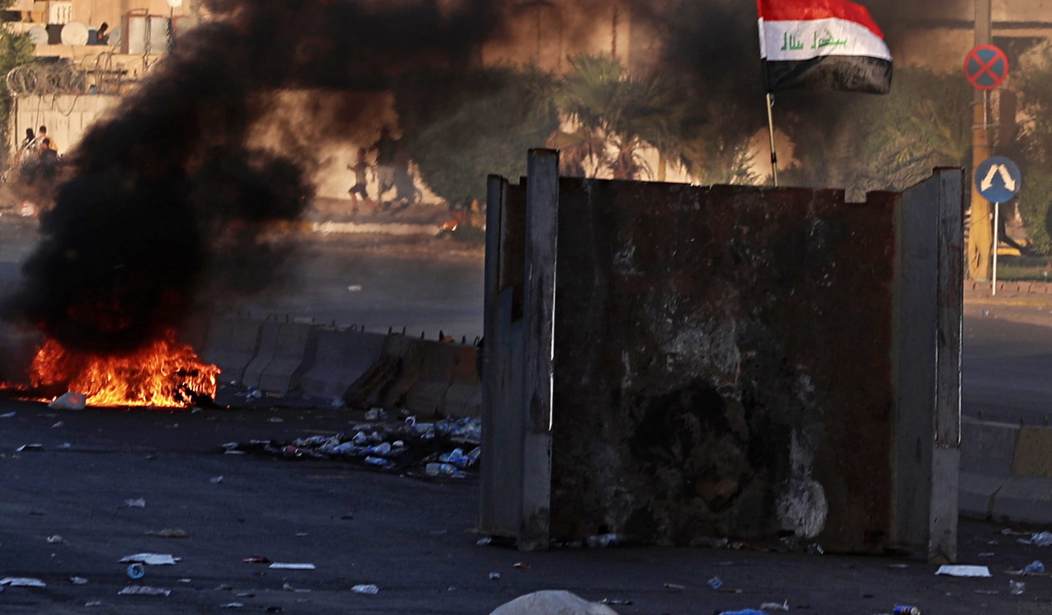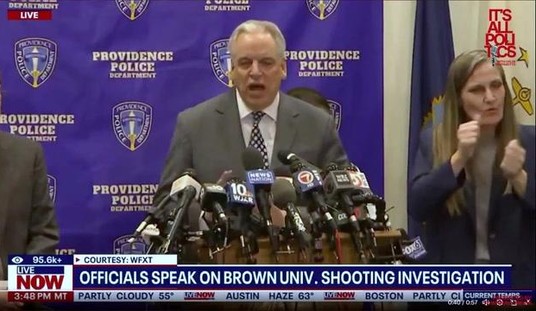Iraq is on fire and Iran doesn’t like it. While police try and maintain order, Iran-backed militias are targeting protesters with sniper fire as Tehran tries to break the back of the protests by murdering the marchers. Six people were killed in Baghdad and 100 wounded as police and the militias sought to clear several sites where protesters had camped out.
Protesters are demanding an end to corruption, the installation of a competent government, and most ominously for Iran, a non-sectarian electoral system. This would dramatically lessen the influence of Shias in the government and the country — something Iran has made no secret in opposing.
The demonstrators, who began taking to the streets in early October, were at first lashing out over unemployment, government corruption and poor public services, but the protests have since demanded a breakup of the politically entrenched sectarian system that took shape after the fall of Saddam Hussein in 2003.
In particular, demonstrators have been accusing Iran and Iran-backed politicians of exerting influence in Iraq, since Iran has strong links to Iraqi security and intelligence forces.
The government crackdown did reduce the numbers of protesters over the weekend, but authorities have been unable to fully quell the unrest among mostly unemployed youth, who have been taking to the streets to object to the country’s political class.
Amnesty International is calling on the government to “rein in” the Shia militias.
Iraqi authorities must immediately rein in security forces after at least six protesters were killed in central Baghdad today amid a police operation to clear demonstrations from several bridges and streets near Tahrir Square, Amnesty International said after interviewing multiple eyewitnesses by phone.
Dozens more protesters were injured in the capital, while media reported that up to 12 protesters were also killed in Basra in recent days.
“Baghdad and Basra have seen yet more bloody days of excessive force meted out against protesters. Iraqi authorities must immediately order an end to this relentless, unlawful use of lethal force,” said Heba Morayef, Amnesty International’s Middle East and North Africa Director.
Iranian interference in Iraq has grown since the Shia militias, which are under the control of Iran’s Revolutionary Guard, were instrumental in the fight to drive ISIS from Iraq. Instead of disbanding after the fight, they have grown in numbers and power.
Over the last month-and-a-half, however, there has been repeated use of snipers firing at random into demonstrations or targeting local protest leaders. The people doing the killing are parts of of the government’s highly fragmented security services and factions of the paramilitary Hashd al-Shaabi or Popular Mobilisation Forces (PMF) known to be aligned with Iran.
It is the Iranian leadership, and more especially General Qasem Soleimani, the commander of Revolutionary Guard’s al-Quds force and supremo of Iranian regional policy, who is orchestrating the campaign to smash the protests by sustained use of violence.
Soleimani’s thugs murdered 18 protesters in the city of Basra in one day. Clearly, the militias and other pro-Iranian security forces are not acting without direction.
Several of their leaders, whose groups were subsequently known to have supplied snipers to shoot at the street protests, were interviewed by The Independent a few days earlier.
Though they later declared that they had long detected a deep-laid conspiracy by the US, Israel, Saudi Arabia and the UAE to use the protests to overthrow the political system in Iraq, they did not say so at the time. Qais al-Khazali, the leader of Asaib Ahl al-Haq, a powerful paramilitary faction, said that “Iran wants a solution [in the US-Iran confrontation] but it cannot say this itself.”
The political elites are not likely to agree to become unemployed, and Shia Muslims, who have been in control of the government since shortly after the fall of Saddam, will not meekly acquiesce and give in to the protesters’ demands.
But the unrest has caused an already shaky Iraqi economy to take a nosedive. Prime Minister Abdul-Mahdi has indicated he’s open to some electoral reforms and has said he would appoint new cabinet ministers in a technocratic government. But that’s not likely to satisfy the young people who want improvements in their daily lives and a more responsive government.
And they’re willing to die to get them.










Join the conversation as a VIP Member